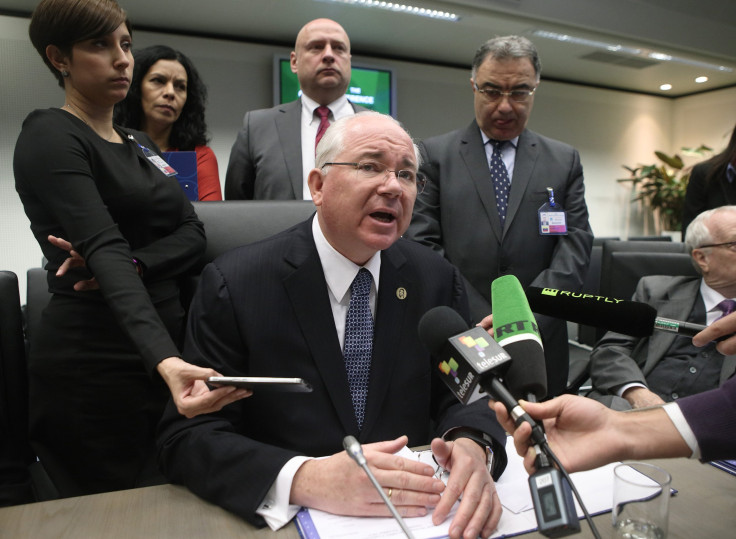Venezuela's Currency, Bonds Plummet As Government Grapples With Oil Prices

Venezuela is scrambling for options as the price of oil, its dominant export, temporarily plunged to a 5-year low on Monday. Caracas has been beset by rumors of an impending default for months, but the warnings have become increasingly dire after OPEC members declined to cut oil production to boost prices.
Last Thursday’s OPEC meeting sharply divided nations as Venezuela and a handful of other oil producing countries failed in their bid to persuade other members to bring down the oil production ceiling. Analysts saw the decision to keep production levels stable as a shrewd move on the part of Saudi Arabia, Kuwait and other nations able to withstand slipping prices while looking for a competitive edge against the booming U.S. shale gas industry. But for other oil producers, including Venezuela, Nigeria, Russia and Iran, the move signals further economic turmoil.
In Venezuela, the bolivar has hit new lows against the dollar, falling to around 155.8 per dollar on the black market Monday -- a 50 percent drop in just the past month. The plunge further widens the gap between black market rates and the official exchange rate, which stands at 6.29 bolivars to the dollar. Meanwhile, a 15 percent minimum wage hike went into effect Monday to combat additional inflation, and Venezuelan bonds plummeted to a five-year low as investors fretted about a looming default.
The government of Venezuelan President Nicolás Maduro, no stranger to calamity in the rocky years after the death of late leader Hugo Chávez, has vowed to keep up the fight for a “fair” oil price of at least $100 a barrel. Oil makes up around 95 percent of Venezuela’s exports and is the primary source of its foreign currency reserves. International oil prices dipped below $70 Monday for the first time since 2010. The International Monetary Fund estimates that Venezuela needs global prices to stay at least above $120 a barrel in order to stay afloat.
Maduro’s administration, having lost its battle to sway OPEC, announced over the weekend that it would slash budgets, all the while maintaining that the beloved social programs that have formed the basis for its support among the poor will remain untouched. Maduro ordered members of his cabinet instead to submit proposals to cut spending, including salaries of senior government employees. The administration also announced the creation of a special commission for reducing expenditures.
“We have taken measures to protect ourselves,” said Foreign Minister Rafael Ramírez, who led Venezuela’s campaign with OPEC to lower oil production levels, in an interview with Venezuelan daily Panorama. “We will not sacrifice the people for the sake of the oil market situation.” Ramírez also said there may be another emergency OPEC meeting in early 2015 to assess the situation.
But it’s not clear what the government’s long-term plan is if oil prices fail to rebound in the coming months, and to what extent the spending cuts will mitigate the downward spiral. Caracas was already grappling with high inflation, shortages and debt before oil prices began slipping over the summer. Economists have been trading warnings about a looming default for months, but fears over Venezuela’s solvency haven’t quelled. “The Venezuelan government has not been very responsive, not acting fast enough to adjust, and not calming the markets with executable plans to respond to these external pressures,” Bank of America strategist Jane Brauer wrote in a report, according to Bloomberg. A recent report from Capital Economics also warned that the “dire state of the economy is likely to trigger renewed social unrest” in Venezuela.
© Copyright IBTimes 2025. All rights reserved.






















